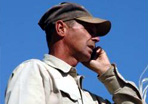Erath, La.

Hank Moss was among the many farmers and ranchers in the disaster zone in Louisiana that received donated hay that was shipped by Farm Aid. The Moss family ranch has been a cornerstone of Erath, Louisiana for three generations. Hank and his brother Sonny work 700 acres raising cattle, rice, crawfish and a world class line of cutting horses – the work horses ridden by cattle ranchers when they manage their herd.
Hank and Sonny lost nearly everything they owned in the tidal surge from Hurricane Rita. The storm decimated their historic 1917 home and most of their farm buildings. Fences were knocked down, trailers overturned, roofs collapsed and their pastures still have salt water standing in them weeks after the storm. At the high point of the surge, the farm, six miles from the shore, was under 10-15 feet of water. More than a month later, cormorants and sea gulls still circle the sky over the pastures and the driveway is crusty with salt residue and dried fish.
Their ranch house is damaged beyond repair. “Where do you start with a situation like this,” Hank asked as he walked Farm Aid staffers Ted Quaday and Laura Freden through the debris that was once his farm. “I mean, there’s nothing left here. Nothing.” Still, he tells us he’s thankful for Farm Aid’s help in bringing hay to the farm: “It helps. That hay over there is the only thing on this farm that is worth anything. Makes me feel like I own something again.”
Hank Moss is known around the country and in Europe as an exceptional trainer of cutting horses. In the days after the storm, he used his name and contacts with cattlemen from all over the country to bring help to his community. Cowboys shipped their gear and horses south to Vermilion Parish to help round up all the stray cattle displaced by the surge.
For now, Hank just has a few animals on his property down the road from what is left of the homestead. This impromptu herd is composed of strays that have yet to be claimed by their owners. The simple act of feeding these few gives this farm a small sense of normalcy in a entirely extraordinary situation.
Hank’s regular herd is on a farm north of the family ranch until the property can safely house them again. The 500 round bales that Hank and his brother had cut and stored for the winter were washed away in the surge. Now he has to start over and the 21 bales he received from Farm Aid will only feed a fraction of his whole herd for a short period of time but it might be enough to start thinking about bringing his animals home.
Hank knows that a farmers’ role goes far beyond just producing food: “I am a third generation farmer. I give a lot back to my community.” With no home, Hank is counting on his community to help him out. He is staying with a friend in town for the time being and eating meals prepared by volunteers of the Red Cross.
If anyone wanted to learn a lesson in how to gracefully combine pride and a humble spirit, Hank Moss would be the person to start with. Despite the losses that he is confronted with every day, Hank is working hard to honor the history of his family’s farm and his role in the community. He takes care of the land and animals that are near while slowly disassembling his families home and a lifetime of history to salvage a few pieces to use as a foundation for a whole new story.


